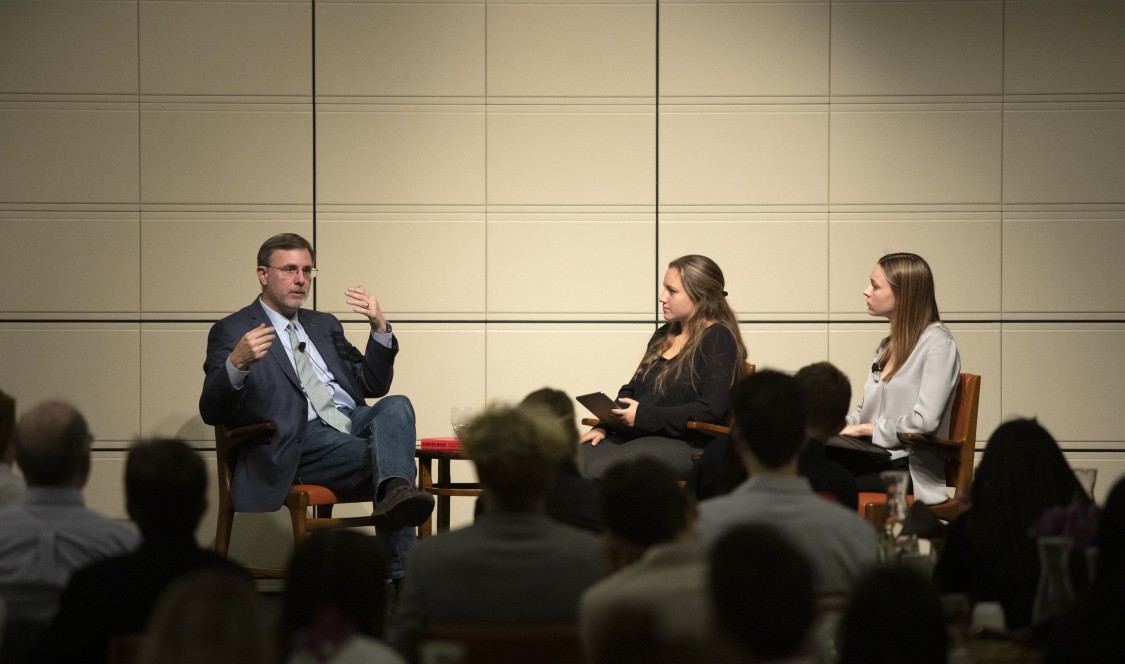After a source recounted a “jaw-dropping” conversation in the White House about immigration, Michael D. Shear ’90 knew it was time expand his coverage of President Trump’s immigration policy into a book.
The veteran political reporter and White House correspondent for The New York Times, and his colleague, Julie Hirschfeld Davis, wrote Border Wars: Inside Trump’s Assault on Immigration to explore the President’s highly contentious views on immigration and the mechanics of an administration attempting to turn them into policy.
Shear, who was a fellow at the Marian Miner Cook Athenaeum while a student at Claremont McKenna College, returned to its stage to discuss immigration, the process of writing the book, and the peculiarities of covering President Trump.
“What better way to understand the President than through an issue that matters so much,” he said.
The book documents the President’s “obsession” with the border wall, down to frequent conversations about what it should be made of, his rages about migrants, and policies such as the travel ban and separating families at the border.
In response to questions from his two student interviewers--Melanie Wolfe ’20, a Politics, Philosophy and Economics major from Boca Raton, Fla., and Sophia Robinson ’20, a Media Studies major from Washington, D.C.-- Shear said the co-authors talked to about 150 people, mostly administration sources. They had already completed the manuscript when President Trump agreed to speak with them. A revealing exchange from that conversation opens the book, with the President responding to the reporters’ question about whether he will be remembered as a xenophobe.
“I hope not,” he said. “Because I am not that way. I hope not—I think you are right—I think the perception might be more that way then the other. ”
Shear, who has a master’s degree from the Kennedy School of Government at Harvard, said the authors took pains to ensure the accuracy of their reporting, leaving out any anecdotes they could not fully confirm. They sent manuscript pages to the people mentioned on them to review for accuracy, and Shear said, “the reporting got even better,” as many of them called the authors to provide more details, notes and emails.
While most presidents rely primarily on briefings and spokespeople to talk to the press, President Trump eschews those traditions. Covering Barack Obama had its frustrations, Shear said, “but we were not operating in an environment where the President and his people view you as an enemy.”
And if the challenge with the highly disciplined Obama was, “to get inside his head,” reporters have to scramble to keep up with President Trump’s frequent tweets, rallies and informal briefings.
Describing himself as an old-fashioned journalist, Shear said Border Wars is not an “anti-Trump” book, and some people have criticized the authors for not taking a stand on the issues and the administration. Staying neutral can be tough, he admitted. “This president says so many untruthful things every single day,” he said. “We have to deal with that. We have to confront that.”
“But the danger is that the reactionary journalists become the thing that Trump is accusing them of, they become the adversary that he imagines them to be,” he said. “I don’t think we should be in the position of fighting with the president. We should write tough stories, fact check him, call him out when he lies, as we do with every president.”
Trump’s White House allies, “brought from the fringes of the party,” initially stumbled as they rushed through drafting executive orders and regulations. “The things they wanted to do were so Draconian, but they didn’t get them done,” he said.
Over time, they became savvier about procedure, and pushed out anyone who blocked their agenda. Shear said he thought the administration has accomplished two major things so far on the issue, “To take the spigot on immigration, legal and illegal, and turn it down,” Shear said. “Immigration has really slowed.”
The second result of Trump’s efforts has been to heat up the rhetoric around the issue, and increase divisiveness. “I think one of his legacies has been to move the left farther left, and to move the right more to anti-immigration.”
- Susan Price

